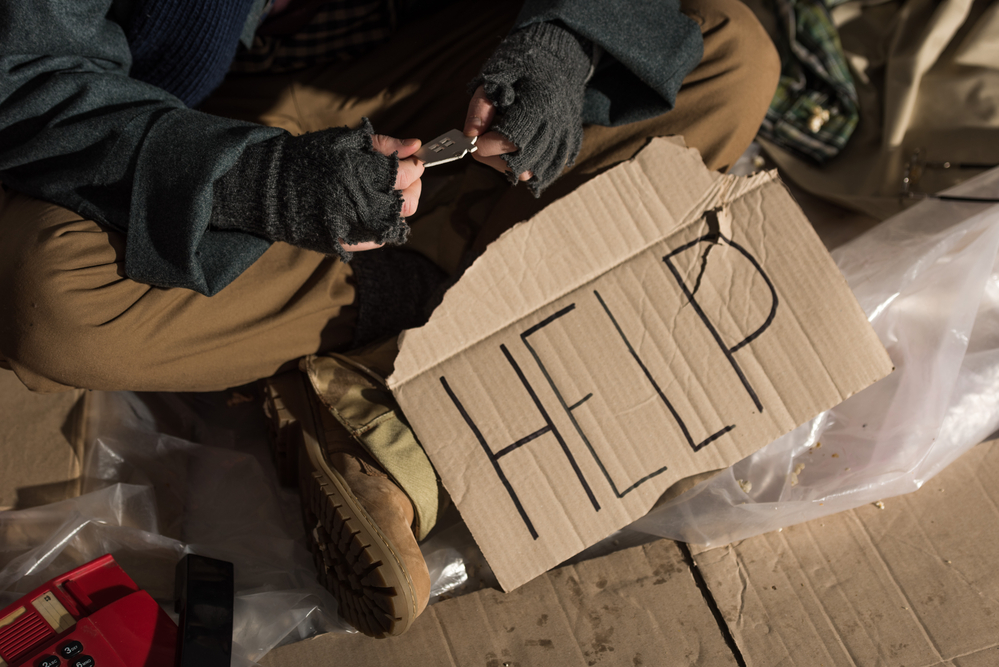In a new article published in Epidemiology and Psychiatric Sciences, Sandrine Loubière and her colleagues examine the Housing First (HF) initiative. This program provides housing to homeless people diagnosed with mental illness as the first step in treatment.
The authors write:
“In homeless people with severe mental illness, the persistent improvements observed in housing stability, hospital service use, subjective QoL and the SF-36 MCS in our study demonstrate the sustainable clinical benefits beyond two years provided by housing subsidies with an ACT support team… over the course of 4 years, the majority of HF users were able to maintain permanent and independent housing, while most participants in the control group still had not reached the endpoint of permanent, independent housing.”
The present research compared a group of HF participants with participants receiving Treatment As-Usual (TAU) that did not emphasize housing. The HF and TAU groups had similar personal recovery outcomes. The HF group enjoyed increased housing stability and autonomy and lower use of hospital services when compared to the TAU group. The HF group also showed increased issues with alcohol use and addiction compared to the TAU group.
 Homelessness is associated with mental health issues in what some authors have referred to as a “never-ending loop.” Homeless people have difficulty accessing mental health services and often report discrimination from service providers based on their mental health diagnoses when they can access services.
Homelessness is associated with mental health issues in what some authors have referred to as a “never-ending loop.” Homeless people have difficulty accessing mental health services and often report discrimination from service providers based on their mental health diagnoses when they can access services.
Housing First (HF) was pioneered in 1991 by a nurse named Liv Evans. After being disappointed with the treatment she witnessed mental health patients receiving, she quit her job as a nurse and began working for a non-profit organization. She was tasked with running a hotel that would house people with mental health diagnoses. Evans decided not to make housing conditional for the people under her care.
Though Evans’ goal was to provide her tenets with a place to be comfortable rather than fix their issues, her tenants had lower instances of drug use and problematic psychiatric symptoms than those in similar programs with conditional housing. HF has since evolved into an evidence-based approach to homelessness and mental illness that recognizes a person’s lack of housing as a cause of mental illness rather than its consequence.
HF programs have been shown in the past to improve participants’ housing stability, quality of life, and community functioning. In addition to reducing homelessness and improving the lives of its participants, HF programs have also been shown to reduce healthcare costs.
The current research examined 703 participants in 4 French cities: Lille, Marseille, Paris, and Toulouse. The participants were overwhelmingly male (82%) and middle-aged (mean age of 39). Each participant was homeless or precariously housed and had a DSM-IV-TR diagnosis of bipolar disorder or schizophrenia.
The participants were divided into an HF experimental group and a TAU control group. The HF group received immediate access to housing, while the TAU group had access to more traditional services, not including housing. These groups were compared in terms of personal recovery outcomes, housing stability, autonomy, and services (such as hospitals) using a range of previously established survey instruments.
The two groups showed no statistically significant difference in terms of personal recovery as measured by the Recovery Assessment Scale. The HF group showed increased autonomy, better sentimental life, higher housing stability, and fewer days admitted to inpatient medical facilities than the TAU group. The HF group showed higher alcohol consumption than their TAU counterparts.
These findings were consistent at both a two-year and four-year follow-up. Although self-reported recovery was similar in each group and the HF group demonstrated more problematic alcohol use, the authors believe the increase in housing stability and autonomy, as well as the decrease in days, admitted to inpatient medical facilities, make HF an indispensable tool in helping homeless populations that struggle with mental illness.
The authors acknowledge several limitations to the current research. HF is a complex intervention with many different elements. The methods used in the present work cannot examine these elements independently. Blinding was not possible, meaning all the interviewers and participants knew which group was receiving which intervention. This research uses self-reported data, which often has reliability issues. The authors also mention that the 4-year follow-up may be too short given the diagnoses they were working with, suggesting a 10-year follow-up may be more appropriate.
****
Loubière S, Lemoine C, Boucekine M, Boyer L, Girard V, Tinland A, Auquier P, for the French Housing First Study Group (2022). Housing First for homeless people with severe mental illness: extended 4- year follow-up and analysis of recovery and housing stability from the randomized Un Chez Soi d’Abord trial. Epidemiology and Psychiatric Sciences 31, e14, 1–9. https://doi.org/10.1017/ S2045796022000026 (Link)















Interesting article, curious why rates of recovery weren’t better and alcohol use was higher? Perhaps just giving them their own space gave them time/space to “use” but is a part of the road back and there’s no way around it. (Otoh lower inpatient days is a plus as that’s how legislators are motivated [reduced costs]).
Report comment
So-called “HF”, or “Housing First”, SHOULD HAVE BEEN HOUSING IN THE FIRST PLACE. Here we see yet more proof that psychiatry is a pseudoscience drug racket social control mechanism. Keeping people housed was the whole point of large State mental hospitals. The “Community Mental Health Center” model has given us far more “mental illness”, drug abuse and dysfunction than we otherwise would have had. Worse outcomes. That HF even needs to be studied shows how clueless and ignorant the system is. HF is part of a services-centered system, and a person-centered process that is long overdue. The current CMHC “mental healthcare system” is system-centered, and a process-centered process. Why is it that ONLY critics of psychiatry can see these TRUTHS? Why are psychiatrists such blind idiots? 20+ years of psychiatry & psych drugs made ME an idiot. When a person is given a lifetime label of “mental illness”, Society owes them food, clothing, AND SHELTER. A HOME. Psychiatry breeds homelessness & helplessness. Psychiatry must change. Housing First is a best way forward. Get on the ball, people!
Report comment
So you mean actually helping people meet their actual NEEDS without forcing them to do anything improves their “mental health?” Gosh, who would have guessed it?
Report comment
First, with all due respect, because you make an exceedingly important point, psychiatrists, etc. don’t really want the “patient” to improve his or her mental health. They just want the patient to show up, do the therapy, take the pills, etc. forever. They actually prefer the patient to stay sick, not get well. There is no profit in a healthy patient, only a sick one.
Second, in a way Bradford is right in that the powers that be especially owe those damaged by the mental health treatments; drugs, therapies, ECT, etc. very decent housing. Sadly, the brain has been so damaged by all the “treatments” the person can no longer successfully work.
Third, I think the best way to deal with most of the homelessness problem is to keep people away from all this mental health evil. We need to help people get decent job training and the like. I would like to see programs where people can get “paid” in a manner that they can obtain the job training, education they need and yet be able to contribute to their housing, food, clothing, etc. as if they had a job. Then after the training, etc. is successfully completed, the individual is assisted in finding real work, etc. It would probably be too complex for many politicians and governmental officials, but the idea is not to give out free money and to give those in need a “hand up” rather than a “hand out.” I am sure this would not work for everyone or solve all the problems, but it would be a start, I think, in the right direction. Thank you.
Report comment
I agree, “the best way to deal with most of the homelessness problem is to keep people away from all this mental health” system “evil.”
Since I know I used to see primarily older homeless people, but too often today, I see homeless young people … and, of course, I wonder what drugs they were given as mere children.
Of course, Steve and Bradford are right, “helping people meet their actual NEEDS without forcing them to do anything improves their ‘mental health.'” Dah, of course “HOUSING IN THE FIRST PLACE” is the sane response to the homelessness issue.
It make zero sense, whatsoever – to anyone with a brain in their head that does not profiteer off of neurotoxic poisoning other humans – that drugs “cure” homelessness, rather than Housing First. How absurd!
Report comment
Removed for moderation.
Report comment
“F*ck this piece of sh*t study. Anyone who knows anything about the housing first model knows that Housing First principles are polar opposite of AOT. You cant be a Housing First participant if a team of people is coming to your door everyday to force/coerce you to ingest drugs as a condition of being a Housing First beneficiary.
Report comment
No, madmom, get it right, girl!….
FUCK THIS BULLSHIT FUCKING PIECE OF SHIT STUDY, and ALL THE FUCKING ASSHOLE PSEUDOSCIENCE DRUG RACKET PSYCHIATRIST LIARS WHO DAILY COMMIT ACTS OF GENOCIDE UPON ALREADY TRAUMARTIZED INDIVIDUALS….
….there, fixed it for you, madmom….
….you’re welcome, ma’am!….
Report comment
Removed for moderation.
Report comment